Medina by the Bay Scenes of Muslim Study and Survival
From the Black Power movement and state surveillance to Silicon Valley and gentrification, Medina by the Bay examines how multiracial Muslim communities in the San Francisco Bay Area survive and flourish within and against racial capitalist, carceral, and imperial logics. Weaving expansive histories, peoples, and geographies together in an ethnographic screenplay of cinematic scenes, Maryam Kashani demonstrates how sociopolitical forces and geopolitical agendas shape Muslim ways of knowing and being. Throughout, Kashani argues that contemporary Islam emerges from the specificities of the Bay Area, from its landscapes and infrastructures to its Muslim liberal arts college, mosques, and prison courtyards. Theorizing the Medina by the Bay as a microcosm of socioeconomic, demographic, and political transformations in the twentieth- and twenty-first centuries, Kashani resituates Islam as liberatory and abolitionist theory, theology, and praxis for all those engaged in struggle.

Neobugarrón: Heteroflexibility, Neoliberalism, and Latin/o American Sexual Practice.
How should we understand the bugarrón, a man who has sex with other men while regarding himself as heterosexual? Reaching beyond queer and gay studies, Ramón E. Soto-Crespo’s research suggests that this paradoxical figure mutated into what he calls the “neobugarrón,” a neoliberal market-oriented actor who used the traditional sexual practice as an optimizing strategy for manipulating the forces of globalization during the 1990s.
In Neobugarrón: Heteroflexibility, Neoliberalism, and Latin/o American Sexual Practice, Soto-Crespo chronicles the cultural modifications of bugarrón, a distinct male-male sexual practice in Latin/o America and the Caribbean, during the twentieth and twenty-first centuries. Working with and against Foucault and Kinsey to examine diverse works from anthropology, literature, cinema, and social media, he investigates a wide array of bugarrón sources, ranging from previously underexamined multimedia to ethnographies, fiction, films, and beyond. These works constitute a neobugarrón archive and attest to a sexual practice currently metamorphosing on the cusp of extinction. Soto-Crespo’s analysis challenges conventional understandings of “heteroflexible” sex between men and reveals a hitherto unnoticed transformation in neoliberal ecologies of bugarrón sexual practice.
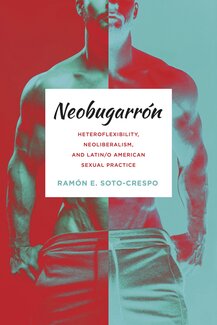
Rendered Obsolete: Energy Culture and the Afterlife of U.S. Whaling
Through the mid-nineteenth century, the US whaling industry helped drive industrialization and urbanization, providing whale oil to lubricate and illuminate the country. The Pennsylvania petroleum boom of the 1860s brought cheap and plentiful petroleum into the market, decimating whale oil's popularity. Here, from our modern age of fossil fuels, Jamie L. Jones uses literary and cultural history to show how the whaling industry held firm in US popular culture even as it slid into obsolescence. Jones shows just how instrumental whaling was to the very idea of "energy" in American culture and how it came to mean a fusion of labor, production, and the circulation of power. She argues that dying industries exert real force on environmental perceptions and cultural imaginations.
Analyzing a vast archive that includes novels, periodicals, artifacts from whaling ships, tourist attractions, and even whale carcasses, Jones explores the histories of race, labor, and energy consumption in the nineteenth-century United States through the lens of the whaling industry's legacy. In terms of how they view power, Americans are, she argues, still living in the shadow of the whale.
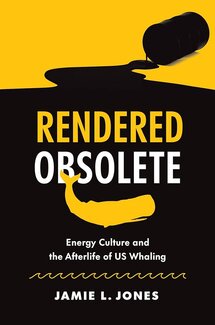
Critical Memory Studies: New Approaches
Bringing together a diverse array of new and established scholars and creative writers in the rapidly expanding field of memory studies, this collection creatively delves into the multiple aspects of this wide-ranging field. Contributors explore race-ing memory; environmental studies and memory; digital memory; monuments, memorials, and museums; and memory and trauma.
Organised around 7 sections, this book examines memory in a global context, from Kashmir and Chile to the US and UK. Featuring contributions on topics such as the Black Lives Matter movement; the AIDS crisis; and memory and the anthropocene, this book traces and consolidates the field while analysing and charting some of the most current and cutting-edge work, as well as new directions that could be taken.
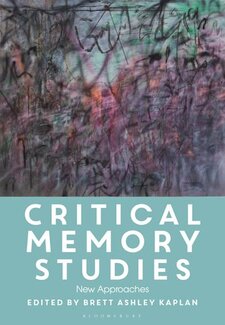
Feminist Approaches to Early Medieval English Studies
Scholarship on early medieval England has seen an exponential increase in scholarly work by and about women over the past twenty years, but the field has remained peculiarly resistant to the transformative potential of feminist critique. Since 2016, Medieval Studies has been rocked by conversations about the state of the field, shifting from #MeToo to #WhiteFeminism to the purposeful rethinking of the label “Anglo-Saxonist.” This volume takes a step toward decentering the traditional scholarly conversation with thirteen new essays by American, Canadian, European, and UK professors, along with independent scholars and early career researchers from a range of disciplinary perspectives. Topics range from virginity, women’s literacy, and medical discourse to affect, medievalism, and masculinity. The theoretical and political commitments of this volume comprise one strand of a multivalent effort to rethink the parameters of the discipline and to create a scholarly community that is innovative, inclusive, and diverse.

Colonial Racial Capitalism (2022)
The contributors to Colonial Racial Capitalism consider anti-Blackness, human commodification, and slave labor alongside the history of Indigenous dispossession and the uneven development of colonized lands across the globe. They demonstrate the co-constitution and entanglement of slavery and colonialism from the conquest of the New World through industrial capitalism to contemporary financial capitalism. Among other topics, the essays explore the historical suturing of Blackness and Black people to debt, the violence of uranium mining on Indigenous lands in Canada and the Belgian Congo, how municipal property assessment and waste management software encodes and produces racial difference, how Puerto Rican police crackdowns on protestors in 2010 and 2011 drew on decades of policing racially and economically marginalized people, and how historic sites in Los Angeles County narrate the Mexican-American War in ways that occlude the war’s imperialist groundings. The volume’s analytic of colonial racial capitalism opens new frameworks for understanding the persistence of violence, precarity, and inequality in modern society.
Contributors. Joanne Barker, Jodi A. Byrd, Lisa Marie Cacho, Michael Dawson, Iyko Day, Ruth Wilson Gilmore, Alyosha Goldstein, Cheryl I. Harris, Kimberly Kay Hoang, Brian Jordan Jefferson, Susan Koshy, Marisol LeBrón, Jodi Melamed, Laura Pulido

Monolingualism and Its Discontents
"What follows brings together scholars, writers, and translators working in fields that are rarely in conversation to see what new insights and frameworks these exchanges might generate. In that spirit of experimentation, it also brings together writers habituated to a variety of genres, both cultural critics and producers—to enrich our explorations of how we count languages and what counts as a language. In every sense, then, this cluster is conceived of as a space to propose new approaches, to pursue unexpected openings, to test hypotheses, and to revise assumptions. Some essays explore hip hop, jargon, and Mesoamerican pictorial writing as monolingual phenomena that challenge how we define language and the range of media we take into account (Calderwood, Chow, Garcia). Several examine the monolingualizing pressures of language policy implemented at the imperial, continental, national, settler-colonial, disciplinary, and familial level, documenting their dispossessive force but also their unforeseen and incalculable consequences (Ben Amor, Choi, Dowling, Fleming, Sorensen, Walkowitz, Watson). A number of essays examine the claims of monolingualism outside European models and histories (Ben Amor, Calderwood, Choi, Dowling, Garcia, Mani). All these essays dwell with acuity and subtlety on the generative and destructive power of monolingualism, asking us to reflect on how our disciplinary expertise and investments, our theories and methodologies, and our pedagogies and institutional practices can better account for the vitality, beauty, and world-building power of the languages that are our inheritance and that will shape our futures. What does our propensity to count languages in whole numbers miss? Rebecca Walkowitz's rousing call to rethink teaching and research in the discipline and more broadly the university through the lens of English as an “additional language” is inspired by a civic hospitality toward “the languages that operate both within and across literary histories” and the conclusion that we simply must “read literatures that begin in languages beyond English.” Her essay, like all the others in this cluster, points the way to other monolingualisms, and to that which is other than monolingualism." - Introduction to Monolingualism and Its Discontents
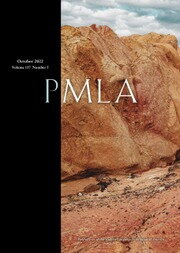
Germany from the Outside: Rethinking German Cultural History in an Age of Displacement
The nation-state is a European invention of the 18th and 19th centuries. In the case of the German nation in particular, this invention was tied closely to the idea of a homogeneous German culture with a strong normative function. As a consequence, histories of German culture and literature often are told from the inside-as the unfolding of a canon of works representing certain core values, with which every person who considers him or herself “German” necessarily must identify. But what happens if we describe German culture and its history from the outside? And as something heterogeneous, shaped by multiple and diverse sources, many of which are not obviously connected to things traditionally considered “German”?
Emphasizing current issues of migration, displacement, systemic injustice, and belonging, Germany from the Outside explores new opportunities for understanding and shaping community at a time when many are questioning the ability of cultural practices to effect structural change. Located at the nexus of cultural, political, historiographical, and philosophical discourses, the essays in this volume inform discussions about next directions for German Studies and for the Humanities in a fraught era.

Faith in Exposure: Privacy and Secularism in the Nineteenth-Century United States
Recent legal history in the United States reveals a hardening tendency to treat religious freedom and sexual and reproductive freedom as competing, even opposing, claims on public life. They are united, though, by the fact that both are rooted in our culture’s understanding of privacy. Faith in Exposure shows how, over the course of the nineteenth century, privacy came to encompass such contradictions—both underpinning the right to sexual and reproductive rights but also undermining them in the name of religious freedom.
Drawing on the interdisciplinary field of secular studies, Faith in Exposure brings a postsecular orientation to the historical emergence of modern privacy. The book explains this emergence through two interlocking stories. The first examines the legal and cultural connection of religion with the private sphere, showing how privacy became a moral concept that informs how we debate the right to be shielded from state interference, as well as who will be afforded or denied this protection. This conflation of religion with privacy gave rise, the book argues, to a “secular sensibility” that was especially invested in authenticity and the exposure of hypocrisy in others.
The second story examines the development of this “secular sensibility” of privacy through nineteenth-century novels. The preoccupation of the novel form with private life, and especially its dependence on revelations of private desire and sexual secrets, made it the perfect vehicle for suggesting that exposure might be synonymous with morality itself. Each chapter places key authors into wider contexts of popular fiction and periodical press debates. From fears over religious infidelity to controversies over what constituted a modern marriage and conspiracy theories about abolitionists, these were the contests, Justine S. Murison argues, that helped privacy emerge as both a sensibility and a right in modern, secular America.
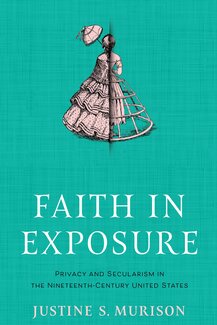
Rare Stuff
"Brett Ashley Kaplan’s novel, Rare Stuff, intertwines whale and human culture in a journey that highlights the need to protect whales and our shared planet. Her support of whale conservation with the proceeds of her novel will ensure the story of whales and our shared ecosystem does not end with her book." Regina Asmutis-Silvia, Executive Director, Whale and Dolphin Conservation
"Rare Stuff is a beautiful, bewitching novel built on interlocking stories: a cosmopolitan photographer named Sid, grieving the death of her father, finds an unfinished manuscript and a suitcase full of clues about the long-ago disappearance of her mother. We follow Sid on a breathless search for her mother, and we dive deep into her father’s unfinished adventure tale, in which Yiddish-speaking whales and a bold teenage girl set out to save the world. By the book’s close, I had become friends with its characters: I wanted to jump into fast-paced conversations about life and literature with Sid, Andre, Dorothy, Aaron, and Sol, and I wanted to take part in the extraordinary multi-generational (and multi-species) community they built together. Rare Stuff tells the story of the very best adventure: the quest we all undertake to understand and care for our parents, our children, and the world we share together." Jamie L. Jones, author of Rendered Obsolete: The Afterlife of U.S. Whaling in the Petroleum Age

100 English Building
608 South Wright Street
Urbana, Illinois 61801